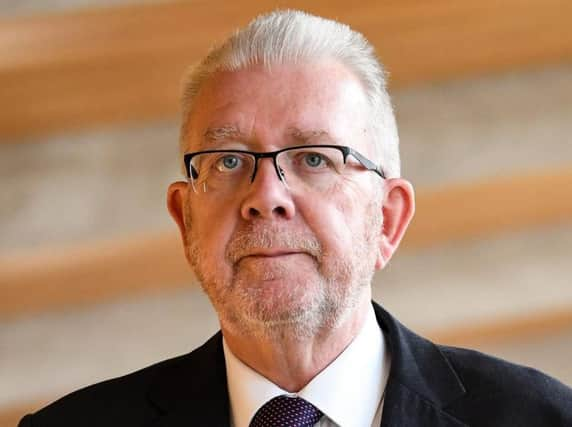Brexit: Mike Russell accused of trying to ‘veto’ Scottish involvement in UK-EU trade talks


Mr Russell was updating MSPs about Joint Ministerial Meetings between the devolved parliaments and the UK government which he said were "increasingly difficult".
He added that while he recognised the UK government's electoral mandate for Brexit, the "mandate we received to give Scotland a right to choose" had not been accepted, and without such "mutual recognition" there could be "no trust" around the future trade negotiations with the EU.
Advertisement
Hide AdAdvertisement
Hide AdConservative MSP Donald Cameron said Mr Russell's statement contained "more grievance and grandstanding in a week when the Scottish Government has excelled at such practices".
He said he had expected Mr Russell's statement to contain "factual matters and detailed proposals about the practicalities of the next 12 months, which as he says will involve the most important negotiations we will know between the UK and the EU but also a number of UK government bills with significant impact".
He added: "By accepting the UK government's mandate for Brexit he must also then accept its mandate for rejecting another independence referendum.
"It seems incredible the Scottish Government will not engage unless its constitutional demands are met - is it his position that no dialogue between Scottish and UK governments can occur without the UK government recognising SNP demands for another independence referendum and does he feel comfortable operating such a veto when livelihoods of Scots are at stake?"
In his statement Mr Russell had said he had "proposed a model for engagement in the second stage of negotiations, which would allow detailed discussion of devolved competencies which could make a difference if there was a genuine commitment from all parties to take part to make it work.
"With a recognition that Scotland will be able to choose this year whether to become an independent country, this model could provide a period of stability in the political structure, but it cannot work if there is no binding commitment to it.
"These negotiations, like all aspects of our relationship with the UK government, cannot continue without mutual recognition of mandates. Once again we've done our part, the UK must do theirs, and they're able to do so refreshed with the vote yesterday to take forward a referendum."
He added the next stage of negotiations with the EU should not continue as "business as usual" and should have the involvement of the devolved nations. "We must continue to have the right to argue against the UK government's decision to end the transition period at the end of the year regardless of negotiations," he said.
Advertisement
Hide AdAdvertisement
Hide AdHowever Scottish Liberal Democrat leader Willie Rennie said: "It is disappointing that the minister is refusing to co-operate in the interests of Scotland unless the UK government agrees to another independence referendum. I don't accept the SNP have the support of a majority of people for a divisive referendum, so will the minister remove the referendum boulder so we might have a chance of co-operation and partnership in these negotiations?"
Scottish Labour's constitution spokesman Alex Rowley said his party backs Scottish Government efforts to "be at the table as equals" in European talks. But he condemned the Scottish Government's "obsession with independence", adding: "There cannot be another referendum anytime soon."
He also questioned why SNP minsters want "even greater constitutional upheaval" after Brexit with a vote on independence.
"The Scottish people's right to choose their own future is not a lightbulb you can switch on and off," he said. "The reason they must have the right to choose in 2020 is clear - we need to have certainty."
